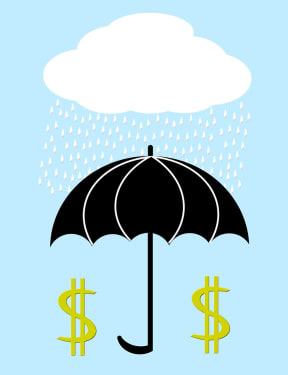Having some money that you can easily access when things go wrong is one of the most important aspects of managing your finances.
A lack of such money is often what tips people into debt that they then struggle to pay off. It can be the start of a slippery slope.
Mary Holm and Jesse Mulligan discuss how much rainy-day money you need, and the different ways you might be able to access the money.
They also look at where you might keep the money.
Sudden expenses can hit us all, the classic is the car breaking down and the eye-watering repair bill that follows. Mary says many of us are unprepared for such contingencies.

Photo: Pixabay
“People are just managing, they’re earning a certain amount of money, managing to cover most bills.”
How much should you put aside?
“Quite a lot of people say three months’ worth of spending and people don’t immediately know what they spend over three months.
“The easy way to get a rough idea of three months of spending is to look at three months of your income and subtract your savings.”
"I’ve heard some people say 6 months of spending but that’s a bit unrealistic"
She says the best thing to do is start a rainy-day fund now.
“Start saving $10 a week or $50 a week and get it into a savings account.”
Listener questions:
Michael has recently taken on a mortgage and wanted to know how much to set aside.
“We bought our first house three months ago and we’re unsure how much cash savings we should keep in hand because we assumed some cash savings for the unexpected is sensible but how much has us a bit stumped.”
Use your mortgage in a way that gives you rainy-day money basically by making extra payments on the mortgage and it’s really important, Mary says, to go to your lender and say to them, ‘If I make extra payments on the mortgage can I get that money back out if I need it? Typically, they’ll say you can.
“If you can’t afford to make extra payments, even if you make regular payments and you need money in a real emergency, go to the lender and ask them if you can borrow back some money – in other words add it to the mortgage,” Mary says.
“Do that before the emergency, go today, go tomorrow talk to the lender and say if I get into trouble would I be able to borrow some back? And under what circumstances.”
She says using the mortgage makes financial sense.
“You’re basically paying mortgage interest rates on this rainy-day money which will be pretty low: it’s much, much better than running up a credit card debt.”
If you don’t have a mortgage, then you need your money somewhere it’s not too easy to get hold of, she says.
“You want a bit of a barrier there, at least a psychological barrier.”
Heather wrote saying she’s worked out how much to put aside, but what was the best place.
I’ve calculated three months of my salary from an inheritance to put aside for an emergency fund, would I be best to invest it as lump sum in month term deposits or split it into different amounts and stagger it on different lengths of term deposit?
“If you’ve got a credit card, and you keep the credit card balance low, pay it off every month, you can borrow against the credit card and within a month that term deposit will have matured before you have to make the extra payments on the credit card and you’re earning some interest on the term deposit.” Mary says
There are also bank accounts that pay interest if you don’t take out your money.
“Bank account interest is pathetic these days, and I do recommend everybody looks on interest.co.nz, don’t just go with what your bank are offering.
And a final word of advice.
“If you raid the fund, please top it up again as fast as possible.”

